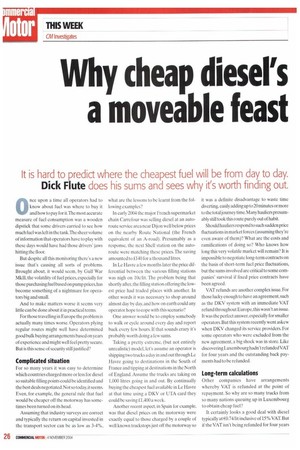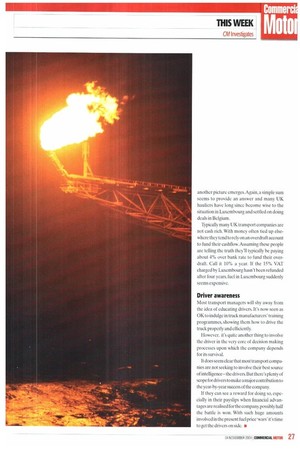Why cheap diesel's a moveable feast
Page 26

Page 27

If you've noticed an error in this article please click here to report it so we can fix it.
It is hard to predict where the cheapest fuel will be from day to day. Dick Flute does his sums and sees why it's worth finding out.
0 nce upon a time all operators had to know about fuel was where to buy it and how to pay for it.The most accurate measure of fuel consumption was a wooden dipstick that some drivers carried to see how much fuel was left in the tank.The sheer volume of information that operators have to play with these days would have had those drivers' jaws hitting the floor.
But despite all this monitoring there's a new issue that's causing all sorts of problems. Brought about, it would seem. by Gulf War MkII, the volatility of fuel prices, especially for those purchasing fuel based on pump prices,has become something of a nightmare for operators big and small.
And to make matters worse it seems very little can be done about it in practical terms.
For those travelling in Europe the problem is actually many times worse. Operators plying regular routes might well have determined good bulk buying arrangements based on years of experience and might well feet pretty secure. But is this sense of security still justified?
Complicated situation
For so many years it was easy to determine which countries charged more or less for diesel so suitable filling points could be identified and the best deals negotiated. Not so today. it seems. Even, for example, the general rule that fuel would be cheaper off the motorway has sometimes been turned on its head.
Assuming that industry surveys are correct and typically the return on capital invested in the transport sector can be as low as 3-4%, what are the lessons lobe learnt from the following examples?
In early 2004 the major French supermarket chain Can-efour was selling diesel at an autoroute service area near Dijon well below prices on the nearby Route National (the French equivalent of an A-road). Presumably as a response, the next Shell station on the autoroute were matching these prices. The saving amounted to £140 for a thousand litres.
In Le Havre a few months later the price differential between the various filling stations was nigh on 10c/lit. The problem being that shortly after, the filling station offering the lowest price had traded places with another. In other words it was necessary to shop around almost day by day, and how on earth could any operator hope to cope with this scenario?
One answer would be to employ somebody to walk or cycle around every day and report back every few hours. If that sounds crazy it's probably worth doing a few sums.
Taking a pretty extreme, (but not entirely unrealistic) model, let's assume an operator is shipping two trucks a day in and out through Le Havre going to destinations in the South of France and tipping at destinations in the North of England. Assume the trucks are taking on 1.000 litres going in and out. By continually buying the cheapest fuel available in Le Havre at that time using a DKV or UTA card they could be savingt1,400 a week.
Another recent aspect, in Spain for example, was that diesel prices on the motorway were exactly equal to those charged by a couple of well known truckstops just off the motorway so it was a definite disadvantage to waste time diverting, easily adding up to 20 minutes or more to the total journey time.Many hauliers presumably still took this route purely out of habit.
Should hauliers respond to such sudden price fluctuations in market forces (assuming they're even aware of them)? What are the costs and ramifications of doing so? Who knows how long this very volatile market will remain? It is impossible to negotiate long-term contracts on the basis of short-term fuel price fluctuations, but the sums involved are critical to some companies' survival if fixed price contracts have been agreed.
VAT refunds are another complex issue. For those lucky enough to have an agreement, such as the DKV system with an immediate VAT refund throughout Europe,this wasn't an issue. It was the perfect answer.especially for smaller operators. But this system recently went askew when DKV changed its service providers. For some operators who were excluded from the new agreement, a big shock was in store. Like discovering Luxembourg hadn't refunded VAT for four years and the outstanding back payments had to be refunded.
Long-term calculations
Other companies have arrangements whereby VAT is refunded at the point of repayment. So why are so many trucks from so many nations queuing up in Luxembourg to obtain cheap fuel?
It certainly looks a good deal with diesel typically at €0.74/lit inclusive of 15% VAT. But if the VAT isn't being refunded for four years another picture emerges. Again, a simple sum seems to provide an answer and many UK hauliers have long since become wise to the situation in Luxembourg and settled on doing deals in Belgium.
Typically many UK transport companies are not cash rich. With money often tied up elsewhere they tend to rely on an overdraft account to fund their cashflow. Assuming these people are telling the truth they'll typically be paying about 4% over bank rate to fund their overdraft. Call it 10% a year. If the 15% VAT charged by Luxembourg hasn't been refunded after four years, fuel in Luxembourg suddenly seems expensive.
Driver awareness
Most transport managers will shy away from the idea of educating drivers. It's now seen as OK to indulge in truck manufacturers' training programmes, showing them how to drive the truck properly and efficiently.
However, it's quite another thing to involve the driver in the very core of decision making processes upon which the company depends for its survival.
It does seem clear that most transport companies are not seeking to involve their best source of intelligence—the drivers. But there's plenty of scope for drivers to make a major contribution to the year-by-year success of the company.
If they can see a reward for doing so, especially in their payslips when financial advantages are realised for the company. possibly half the battle is won. With such huge amounts involved in the present fuel price 'wars' it's time to get the drivers on side. •






























































































































































































